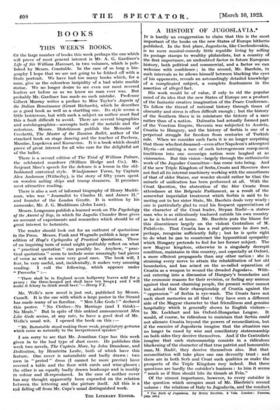BOOKS -
THIS WEEK'S BOOKS.
OF the large number of books this week perhaps the one which will prove of most general interest is Mr. A. G. Gardiner's
Life of Sir William Harcourt, in two volumes, which is pub- lished by Messrs. Constable. In the case of so long a bio- graphy I hope that we are not going to be fobbed off with a State portrait. We have had too many books which, for a man, give us the colourless insipidity of a bad white marble statue. We no longer desire to see even our most revered leaders set before us as we know no man ever was. But probably Mr. Gardiner has made no such mistake. Professor Gilbert Murray writes a preface to Miss Taylor's Aspects of the Italian Renaissance (Grant Richards), which he describes as a good book as well as a startling one. Its style seems a little boisterous, but with such a subject an author must find this a fault difficult to avoid. There are several biographies and autobiographies—accoupts both of the notable and the notorious. Messrs. Hutchinson publish the Memoirs of Cecchetti, The Master of the Russian Ballet, author of the standard book on stage dancing and the teacher of Pavlova, Massine, Lopokova and Karsavina. It is a book which should prove of great interest for all who care for the delightful art of the ballet.
There is a second edition of The Trial of William Palmer, the celebrated murderer (William Hodge and Co.). Mr. Serjeant Shee's speech for the defence is a lesson in the old- fashioned oratorical style. Windjammer Yarns, by Captain Alex Anderson (Witherby), is the story of fifty years spent on wooden sailing ships and tramp steamers. It promises most attractive reading.
There is also a sort of informal biography of Henry Muddi- man, who was "Journalist to Charles II. and James II." and founder of the London Gazette. It is written by his namesake, Mr. J. G. Muddiman (John Lane).
Messrs. Longmans publish a learned work on The Psychology of the Ascent of Sap, in which Sir Jagadis Chunder Bose gives an account of experiments and researches which should be of great interest to botanists.
The reader should look out for an outburst of quotations in the Press. Messrs. Funk and Wagnalls publish a large new edition of Hoyt's Cyclopedia of Practical Quotations. Those of an inquiring turn of mind might profitably reflect on what a "practical quotation" can possibly be. Anyhow, " prac- tical quotations" seem to include some amazingly bad pieces of verse as well as some very good ones. The book will, I fear, be very useful, and, incidentally, it makes very amusing reading. I cull the following, which appears under " Proverbs" :—
"There shall be in England seven halfpenny loaves sold for a penny : the three-hooped pot shall have ten hoops ; and I will make it felony to drink small beer."— Henry VI.
Mr. Wells's new novel is just out, published by Messrs. Cassell. It is the one with which a large poster in the Strand has made many of us familiar. "Men Like Gods ! " declared this poster. "No Clothes—No Marriage (and I think)— No Meals." But in spite of this unkind announcement Men Like Gods seems, at any rate, to have a good deal of Mr. Wells's usual wit. I opened the book on this :—
" Mr. Barnstable stood making those weak, propitiatory gestures which come so naturally to the inexperienced speaker."
I am sorry to see that Mr. Jonathan Cape has this week given in to the bad type of dust cover. He publishes this week two novels, The Captain More, by John Brandane, and Dedication, by Henrietta Leslie, both of which have this feature. One cover is naturalistic and badly drawn : twO men in " period " dress (I cannot be more precise) have covered a table and the floor with cards and wine-glasses ; the other is an equally badly drawn landscape and is muddy in colour and ill-reproduced. In the case of neither cover has any thought apparently been expended on the relation between the lettering and the picture itself. All this is a tad falling off from Mr. Cape's usual distinguished work.
Tam LITERARY EDITOR.










































 Previous page
Previous page